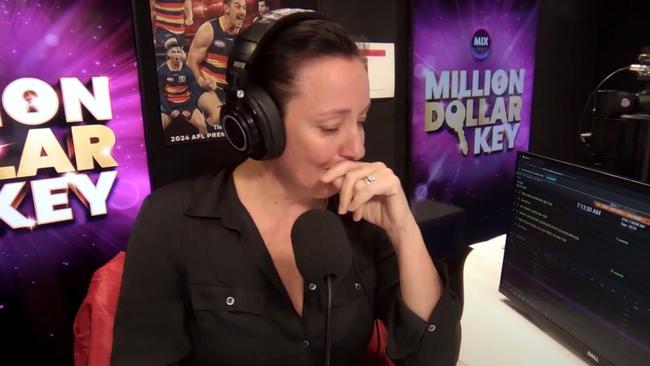The breast check Ali effect: How Mix 102.3’s Ali Clarke is helping save lives
Radio star Ali Clarke shared her breast cancer diagnosis in an emotional segment on her show this morning. The reaction from her listeners has been instant and profound.
SA News
Don't miss out on the headlines from SA News. Followed categories will be added to My News.
The “Ali effect” has already taken hold with an noticeable increase in the number of women booking mammograms with BreastScreen SA.
On Tuesday morning Mix 102.3 breakfast presenter Ali Clarke announced she was battling breast cancer and would be having a mastectomy later this week.
She said there was no history of the disease in her family, but that she had a mammogram on the advice of her GP.
Clarke said her doctor had wanted to do a full health check after she went to see them because she was concerned about what she thought were symptoms of perimenopause.

BreastScreen SA program director Lauren Civetta thanked Clarke for sharing her story at what was a “highly emotional time”.
Ms Civetta said there had been a definite “uptick”, with bookings more than doubling on Tuesday, ollowing Clarke’s announcement. There were 779 bookings for mammograms compared to the usual average of 350.
Ms Civetta also encouraged women – no matter how busy – to make an appointment for a mammogram because it was “15 minutes … that can save your life”.
While it is early days for the “Ali effect”, an uptick in mammogram bookings has happened before when a celebrity diagnosis became public.
After Kylie Minogue was diagnosed with breast cancer at age 36 in 2005 there was a ``Kylie effect’’.

Researcher Simon Chapman, professor of public health at the University of Sydney, found news coverage of Minogue’s breast cancer journey – which included a lumpectomy – led to an unprecedented increase in bookings for breast screening.
Professor Chapman’s research was in relation to women over 40 who booked mammograms as part of the government’s BreastScreen programs in the 19 weeks before, two weeks during and six weeks after the publicity.
Professor Chapman’s findings were published in the Medical Journal of Australia. He stated overall bookings for breast screening increased by 40 per cent in the two weeks of Minogue-related publicity and that there was a 101 per cent increase in bookings for women aged 40-69 who had never been screened.
BreastScreen SA clinical director Associate Professor Michelle Reintals said she applauded Clarke for speaking out about her diagnosis and the importance of early detection. She said that mannmograms were not recommnded for women under 40 because there was “not clear evidence” that having them was advantageous for that age group.
One in seven women will be diagnosed with breast cancer in their lifetime. For women over 40 a mammogram is the most effective method of detecting breast cancer early.
Book a mammogram at breastscreen.sa.gov.au or by phoning 13 20 50.
More Coverage
Originally published as The breast check Ali effect: How Mix 102.3’s Ali Clarke is helping save lives




